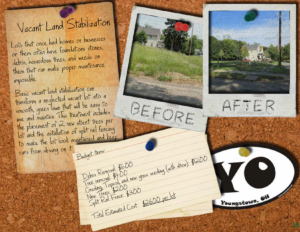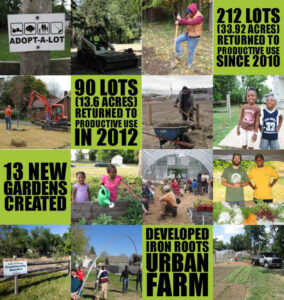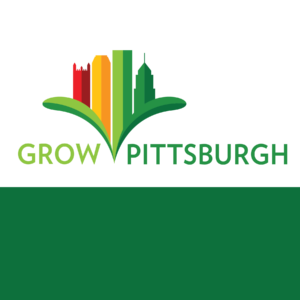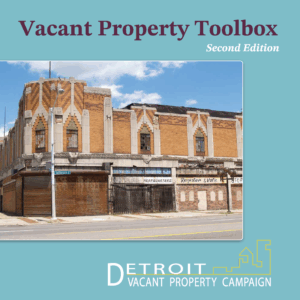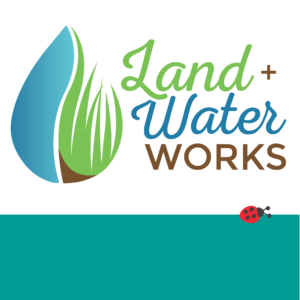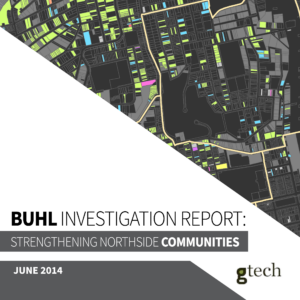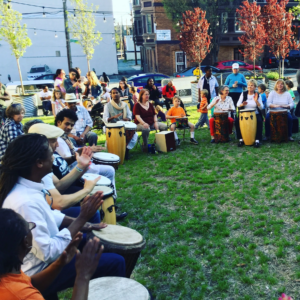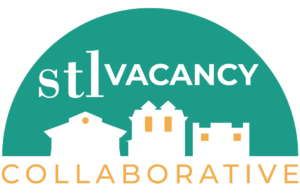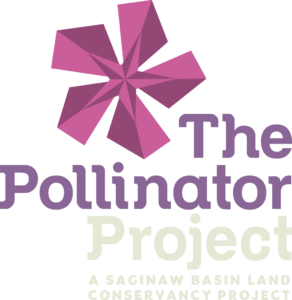Vacant Land Elements Examples by Type
Nonprofit
Youngstown Neighborhood Development Corporation
The Youngstown Neighborhood Development Corporation (YNDC) has produced a number of planning resources and guides to assist neighborhood groups with grassroots efforts to stabilize neighborhoods.
Read More »Youngstown Neighborhood Development Corporation
Lots of Green was the Youngstown Neighborhood Development Corporation (YNDC)’s vacant land reuse program, which operated cleanups and volunteer workdays in strategic neighborhoods, as well as vacant land reuse classes, microgrant programs, and competitions that catalyzed new projects around the city.
Read More »Grow Pittsburgh
Liability insurance is often required to access land — such as the vacant lots owned by the City of Pittsburgh — or to participate in certain programming A Commercial General Liability (CGL) insurance policy is the first line of defense against many common claims (such as bodily injury or property damage) that could occur in a community garden or on other sites included in the policy.
Read More »Detroit Vacant Property Campaign
The Vacant Property Toolbox provides a broad overview of considerations in working collaboratively to reduce vacancy, and includes strategies for community organizing, marketing, and managing vacant lots. Community organizations may find this handbook useful in addressing vacant properties, while residents may find some of the organizing and planning information useful as they navigate working to address vacancy as individuals.
Read More »Land + Water WORKS Coalition
The Land + Water WORKS Coalition is a collective of environmental stewards dedicated to a more equitable, more climate-resilient future for Detroit through research, education, outreach, technical assistance, installation, and advocacy.
Read More »Grounded PGH (Formerly GTECH)
The Northside Vacant Lot Assessment collected information on the condition of vacant lots in Pittsburgh’s 19 Northside neighborhoods. The assessment was conducted by resident volunteers and community organizations.
Read More »Wilmington Alliance
The Wilmington Alliance is a collaborative organization aimed at community wealth creation and neighborhood revitalization.
Read More »Detroit Future City
The Field Guide to Working with Lots provides step-by-step instruction for 38 landscape designs on vacant lots.
Read More »St. Louis Vacancy Collaborative
“The St. Louis Vacancy Collaborative is a coalition of community members, private and nonprofit stakeholders, and City agencies committed to reducing vacant property in St. Louis. The Collaborative helps to coordinate existing vacancy efforts under one umbrella and empowers the public and private sectors to work together toward solutions. We convene committees…
Read More »Saginaw Basin Land Conservancy
The Pollinator Project uses re-naturalization techniques to stabilize vacant urban land in Saginaw, MI. Through a partnership with the Saginaw County Land Bank, the Pollinator Project has transformed over half the land bank’s vacant lot inventory. Other partners, including community groups, local universities, businesses, and funders, make the Pollinator Project…
Read More »- « Previous
- 1
- 2
- 3
- Next »
The Grandmont Rosedale Development Corporation (GRDC)’s Vacant Property Task Force is a resident-led initiative to target and prevent blight and vacancy in the five neighborhoods GRDC serves. Working closely with resident volunteers, the task force monitors vacant homes with the goal of ensuring that every property is properly maintained.
Read More »Baltimore Environmental Equity Partners (BEEP) aims to foster cross-sector collaboration to improve community and environmental well-being and sustainability in neighborhoods of East Baltimore. BEEP is comprised of nonprofit and government organizations working on community development, community organizing, environmental and health advocacy, and social justice.
Read More »The Allegheny Green Web Collaboration is a network of more than 20 nonprofit recreation and conservation organizations with a vision for connected parks, open spaces, and trails throughout Allegheny County to enhance the quality of people’s daily lives, promote healthy living, and encourage increased engagement with nature. The collaboration manages a website providing an interactive narrative of their efforts.
Read More »Developed through a partnership between the Pennsylvania Department of Conservation and Natural Resources and the Pennsylvania Downtown Center this handbook provides strategies for communities to utilize their natural, outdoor recreational resources as assets to grow and enhance their community and economic development.
Read More »The East Trenton Neighborhood (ETN) Brownfields Area-Wide Plan provides site-specific recommendations for 12 brownfield sites with an emphasis on two catalyst sites that have the greatest likelihood of development and impact. Cities dealing with high rates of vacant land and contamination may find this plan helpful in understanding the opportunities and challenges of putting properties back into productive use in a safe and healthy way.
Read More »In 2014, the Trenton Neighborhood Restoration Campaign (TNRC) organized the first truly comprehensive, parcel-level survey of all the vacant properties in Trenton — mapped, published, and updated on this interactive website. The TNRC also organized residents and local groups to draw attention to the problems caused by vacant and abandoned properties.
Read More »The Vacant Land 215 Toolkit is a guide for both new and current gardeners in Philadelphia looking to use land productively, understand how to gain legal access to City-owned vacant spaces for community food production or open space, or understand what legal protections are available for existing community gardens.
Read More »The PGH Mobile Toolbox is a library of landscaping tools available for free to resident groups and community organizations in Allegheny County to use in the care and stewardship of vacant land and community green spaces.
Read More »Lots to Love is an online guide for community organizations and residents in the Pittsburgh region who are interested in transforming vacant lots into well-loved spaces. This website, created by the nonprofit Grounded Strategies, connects users to resources and ideas to support reuse of vacant lots, and provides information about organizations currently doing this work in the Pittsburgh region.
Read More »The Tree Equity Score tool calculates a “tree equity score” for all 150,000 neighborhoods and 486 municipalities in urbanized areas across the continental United States.
Read More »
